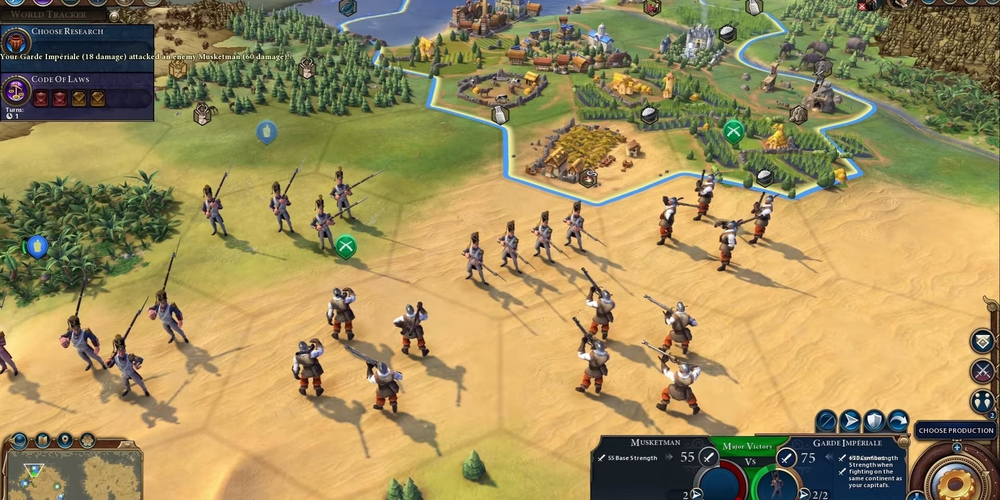Understanding the dynamics of the Civilization series is crucial for achieving success in your gameplay. Whether you’re a newcomer or a seasoned player, mastering the nuances of expansion, resource management, and strategic gameplay can significantly enhance your experience. In this guide, we delve into essential strategies that can help you build a thriving civilization and navigate the complexities of the game.
The Balance of Expansion
Finding the right balance in city expansion is pivotal for any player. Underexpansion can leave your civilization vulnerable, stunting growth and reducing competitiveness. On the other hand, overexpansion can lead to severe resource strain, unhappiness, and a lack of effective defense. Each iteration of Civilization presents its unique challenges; for example, Civilization V encourages a more conservative expansion strategy compared to its predecessors.
To optimize your civilization’s growth, focus on recognizing and maintaining a sustainable economy. This involves strategically placing cities in resource-rich areas while managing their growth wisely. Aim to strike a balance between the number of cities and the available resources to ensure that each city can thrive without overwhelming your economy. Regularly assess your happiness levels and resource allocations to avoid stagnation and ensure a prosperous civilization.

The Importance of Wonders
Wonders are a cornerstone of any civilization and provide significant advantages that can propel you ahead of your competitors. These structures offer immediate benefits that accumulate over time, enhancing your civilization’s research, production, and overall performance. Prioritizing the construction of wonders, particularly early in the game, can yield substantial rewards. For instance, the Sydney Opera House boosts culture and can trigger a golden age, amplifying output across various fields.
When planning your wonder construction, assess how each aligns with your overarching strategy. Some wonders are more suited for cultural victories, while others may enhance military capabilities or technological advancements. By aligning your wonder-building efforts with your immediate needs and long-term goals, you can gain a significant edge over your rivals. Remember, timing is crucial; completing wonders before your opponents can solidify your position in the game.
Strategic Gameplay: Build Tall vs. Build Wide
In the Civilization series, players often face the critical choice of adopting a “tall” or “wide” strategy. Building tall focuses on developing a few strong cities that maximize citizen output, while building wide involves establishing many cities that can leverage more resources and land. Each approach comes with its own advantages and drawbacks, particularly concerning happiness and production levels.
Choosing the right strategy should align with your civilization’s traits and the victory conditions you are pursuing. For instance, a civilization with bonuses to happiness may thrive with a wide strategy, while those with advantages in production might benefit from a tall approach. Balancing these strategies is essential, as a lack of happiness can significantly impact productivity. Be prepared to adapt your strategy based on the game state, competition, and the unique strengths of your civilization.
The Role of Diplomacy
Diplomacy is a vital component of gameplay in Civilization, influencing your civilization’s survival and success. Building relationships with other civilizations can lead to beneficial trade agreements, alliances, and mutual protection pacts. Conversely, neglecting diplomatic efforts can result in isolation, hostility, and ultimately, failure. Understanding each civilization’s agenda and motivations is key to navigating these complex relationships.
Forming alliances can provide strategic advantages, especially during conflicts. You can leverage diplomatic channels to negotiate trade deals that enhance your economy or to coordinate military efforts against a common enemy. Always be prepared to adapt your diplomatic strategies in response to the evolving dynamics of the game. Being aware of rival civilizations’ actions and intentions allows you to anticipate their moves and adjust your strategy accordingly.
Resource Management and Economy
Effective resource management is the backbone of a successful civilization. Players must strike a delicate balance between economy, production, and happiness to sustain growth and prevent stagnation. Poor resource management can lead to a decline in your civilization’s power and influence, making it crucial to monitor resource allocation continuously.
Trade routes are an excellent way to bolster your economy and foster relationships with other civilizations. By ensuring a steady flow of resources, you can support both military expansion and cultural development. Prioritize luxury resources to maintain happiness levels and avoid penalties that can hinder your progress. Regularly evaluate your economic strategies and adjust them in response to changes in the game landscape to ensure the continued growth and prosperity of your civilization.
Adapting to Changing Game States
The state of the game can shift dramatically based on player actions, technological advancements, and other evolving factors. Flexibility in strategy is crucial for navigating these changes effectively. Players should continually assess their position and adapt their tactics to respond to new challenges and opportunities.
Whether facing aggressive neighbors or pursuing a cultural victory, being ready to pivot your strategy can be the difference between success and failure. Experimenting with different approaches can also enhance your understanding of the game and increase your enjoyment. Stay alert to opportunities for growth and advancement, and don’t hesitate to modify your plans based on the current game dynamics. Adaptability is a key trait of successful players.
The Power of Military Strategy
Military strength is essential for both defense and expansion in Civilization. Players must carefully balance military unit production with other development needs to avoid neglecting economic and technological growth. Focusing too heavily on military might lead to a lack of resources for other vital areas, while failing to build a sufficient military can leave your civilization vulnerable to attacks.
Understanding unit mechanics and the strengths of your chosen civilization can inform your military strategies. Learn when to engage in warfare and when to adopt a more pacifist approach for optimal success. The timing of military actions is crucial; launching an attack at the right moment can yield significant advantages, while premature aggression can lead to unnecessary losses. Always be prepared to adjust your military strategies based on the actions of other players and the overall state of the game.
The Significance of Victory Conditions
Each game of Civilization offers multiple paths to victory, and players should keep these conditions in mind throughout their strategy development. Tailoring your gameplay based on the type of victory you’re pursuing—whether military, cultural, or scientific—can improve your chances of success. Awareness of other players’ goals is equally important; this knowledge allows you to anticipate their moves and counteract their strategies effectively.
As the game progresses, be prepared to adjust your focus if necessary. Staying flexible ensures that you can seize opportunities as they arise. For instance, if you notice another civilization making significant strides towards a cultural victory, you may need to pivot your strategy to counteract their progress. Remember, each game is unique, and adapting to new challenges is a critical aspect of achieving victory.
The Lessons of Civilization
Playing Civilization imparts valuable lessons about strategy, resource management, and diplomacy. Each match provides insights into the complexities of human interaction and competition, enhancing your gameplay experience. Understanding the importance of adaptability, foresight, and decision-making can significantly improve your performance.
Embrace the unpredictability of human opponents and learn from each game. Reflect on your successes and failures to refine your strategies and approach. Ultimately, the goal is to enjoy the journey of building your civilization, regardless of the final outcome. Keep these lessons in mind as you embark on your next adventure, and strive to apply them to enhance your gameplay experience in the Civilization series.
Armando Maynez
Engineer, industry executive, research enthusiast. Avid learner with diverse interests in coding, machine learning, artificial intelligence and reinforcement learning. 17+ years of experience working in multinational corporations.



Comments